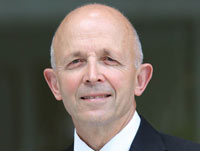
An “institutionalised lack of trust” in local authority social work and a tendency for professionals to blame each other are among the early concerns identified by the family justice review.
Speaking to Community Care as the review closed its call for evidence today, review chair David Norgrove said the evidence received so far showed “very different perspectives,” but an underlying theme of “deep concern” regarding court delays and the cost of delivering justice. It also gave a clear indication of the “immense strain” everyone is under.
“The general feeling is that we cannot go on like this,” he said. “When you look at the way in which the system is operating it’s clear that, despite a huge amount of commitment, effort and expertise from all involved, there are very real problems. Although we call it the family justice system, it is not a system. It doesn’t operate coherently.”
A contributing factor, Norgrove said, was a lack of trust in local authority social work. “It’s an institutionalised lack of trust and a vicious circle. Courts don’t always trust assessments by social workers and order more assessments. The whole process has become too drawn out.”
Many will be eagerly awaiting what the review concludes on the fate of family courts body, Cafcass, which has been the subject of much criticism from lawyers and guardians. Norgrove would not be drawn on whether Cafcass was fit for purpose, adding that the more pertinent question concerned what role Cafcass should play in the family justice system.
He said this was being carefully considered by the panel and said all members, “recognise that Cafcass is under a lot of pressure”.
He added that there was a tendency within the family courts for professionals and organisations to blame each other for problems inherent within the system. This was a classic symptom of people feeling, “done to, not in control of their own destiny and unable to manage their budgets together,” he said, but insisted that no single party was to blame.
As Community Care recently reported, the review will be looking at how to divert more cases from court through mediation and dispute resolution, Norgrove confirmed. He said too many people are currently being pushed towards legal proceedings.
“For example, if you want to fill in the form to get divorced you need to know how it is numbered and details of the Children Act. Most people won’t be able to get this so they are being forced down the route of consulting solicitors.”
But despite concerns from some lawyers, Norgrove said mediation was supported by much of the legal profession. “We have taken evidence which shows that some lawyers are preparing for this and see it as an opportunity for lawyers to be more involved in mediation,” he said.
Ensuring that the voice of the child was still heard in non-adversarial processes, such as mediation and tribunals, would be a key part of the review process, Norgrove said.
The review will also be looking at how the scrutiny of care plans could be speeded up, and who should do this. “Care plan scrutiny has increased. They are taking more time and effort because of more expert assessments. This is partly to meet adults’ rights but the risk is that this could be compromising the rights of the child.”
Norgrove also said he believes there should be “more joined-up thinking between children’s services and family justice.” He confirmed that he will be working closely with Eileen Munro as both the family justice review and the Munro review progress.
He recognised the pressure the whole system was under, and stressed the importance of working together and being realistic. “We know there isn’t going to be any more money, that’s a given. Therefore calling for more funds, more courts or more Cafcass staff just isn’t going to happen. We have to be realistic and work together.”
In public law the average length is now about 56-57 weeks in county courts. The total cost of the family justice system is estimated at over £1.6bn a year, while the cost of looked-after children is about £2.5bn a year. About 90% of cases are already settled outside of court in private law.
David Norgrove biography
Norgrove began his career at the Treasury, where he started as an economist.
1985-8: Private secretary to prime minister Margaret Thatcher
1988-2000: Joined Marks & Spencer, holding various senior positions before being appointed to the Board
2000-4: Chair of the pension fund trustees
2005-present: Became first chair of The Pensions Regulator
2009-present: Chair of the Low Pay Commission
2010: Appointed chair of the Family Justice Review Panel
Related Articles
Role of lawyers in family courts at risk
Family justice system to ‘implode’, warns top judge
What do you think? Join the debate on CareSpace
Keep up to date with the latest developments in social care. Sign up to our daily and weekly emails


 Assistive technology and dementia: practice tips
Assistive technology and dementia: practice tips  A trauma-informed approach to social work: practice tips
A trauma-informed approach to social work: practice tips 




 Find out how to develop your emotional resilience with our free downloadable guide
Find out how to develop your emotional resilience with our free downloadable guide  Develop your social work career with Community Care’s Careers and Training Guide
Develop your social work career with Community Care’s Careers and Training Guide  ‘Dear Sajid Javid: please end the inappropriate detention of autistic people and those with learning disabilities’
‘Dear Sajid Javid: please end the inappropriate detention of autistic people and those with learning disabilities’ Ofsted calls for power to scrutinise children’s home groups
Ofsted calls for power to scrutinise children’s home groups Seven in eight commissioners paying below ‘minimum rate for home care’
Seven in eight commissioners paying below ‘minimum rate for home care’
 Facebook
Facebook X
X LinkedIn
LinkedIn Instagram
Instagram
Comments are closed.